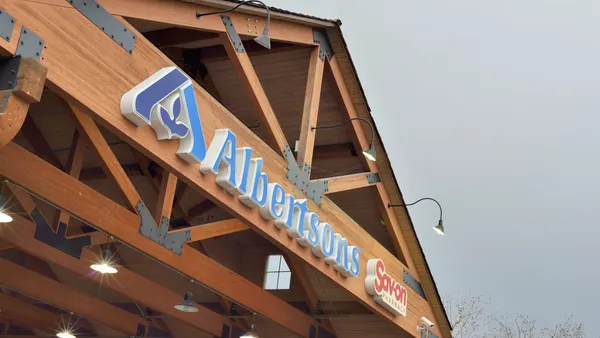Dive Brief:
- Meijer has launched beer and wine delivery from 40 stores in Ohio through e-commerce partner Shipt. The chain kicked off alcohol delivery in Michigan back in July.
- Though the midwestern chain has offered grocery delivery for some time now, getting into the business of beer and wine took a bit longer to implement. But Keith Rothstein, group vice president of merchandise services at Meijer, said that the expansion came from a customer demand for the chain’s large alcohol selection.
- All deliveries will be handled by employees 21 years or older, and customers must show identification of legal drinking age upon receipt.
Dive Insight:
Meijer’s home delivery service debuted just over a year ago, and now reaches more than 11 million households in Michigan, Illinois, Wisconsin, Ohio, Indiana and Kentucky, offering more than 70,000 grocery items.
Now Meijer joins the growing list of online grocers offering alcohol sales, including Amazon. After a popular launch in London, Amazon expanded the sales to Seattle, Portland, Cincinnati and Columbus through Prime Now. In June, the e-tailer launched two-hour alcohol delivery in Austin, Dallas, Houston and San Antonio.
Not to be outdone, H-E-B also introduced wine and beer delivery this summer to cities across Texas. Other supermarkets that offer alcohol delivery include Publix and Walmart and consumers can also get the products through delivery services such as Doordash and Postmates.
The online alcohol market has grown in step with grocery e-commerce, but one firm believes the market will soon bubble up. According to Rabobank analysts, alcohol accounts for around 2.5% of online food and beverages currently and will grow to 14% by 2025. As grocers leverage their brick and mortar stores, the firm predicts, demand will grow.
Indeed, while direct shipping outfits have traditionally had to navigate a maze of regulations with alcohol, grocers have an advantage because they're delivering from their stores.
Still, grocers will have to compete with pure-play online alcohol retailers such as Drizly, which now reaches 100 North American markets and delivers — using local retailers for distribution — in as little as an hour.
Moving forward, grocers looking to differentiate themselves in the digital space will likely start to offer beer and wine deliveries, assuming that the logistics are cost-effective. If booze delivery is set to become a leading online category, as analysts believe, it could be a way for grocers to entice shoppers to use their e-commerce platform.










